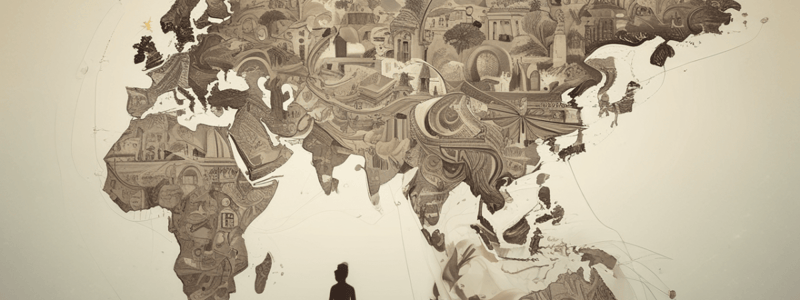Podcast
Questions and Answers
How can culture be defined in relation to human interaction?
How can culture be defined in relation to human interaction?
Culture is a product of human interaction.
What role does social heritage play in culture?
What role does social heritage play in culture?
Social heritage is a complex and socially transmitted aspect of culture.
How does culture provide for biological and social needs?
How does culture provide for biological and social needs?
Culture provides socially acceptable patterns for meeting biological and social needs.
Give two examples of elements that can be considered part of culture.
Give two examples of elements that can be considered part of culture.
What is the significance of folk art in understanding culture?
What is the significance of folk art in understanding culture?
How do celebrations relate to cultural practices?
How do celebrations relate to cultural practices?
Why is language considered a fundamental aspect of culture?
Why is language considered a fundamental aspect of culture?
What is the importance of understanding cultural dress and manners?
What is the importance of understanding cultural dress and manners?
What is one distinguishing factor of culture as described in the content?
What is one distinguishing factor of culture as described in the content?
What are two examples of non-material culture?
What are two examples of non-material culture?
How are social norms related to culture?
How are social norms related to culture?
Describe the concept of folkways within the elements of culture.
Describe the concept of folkways within the elements of culture.
What is the difference between mores and values in culture?
What is the difference between mores and values in culture?
Define ethnocentrism and its significance in the study of culture.
Define ethnocentrism and its significance in the study of culture.
Flashcards are hidden until you start studying
Study Notes
What is Culture?
- Culture is a product of human interaction, shaping social behaviors and customs.
- Represents a complex social heritage, transmitted socially across generations.
- Provides patterns for fulfilling biological and social needs.
- Cultures distinguish between communities and establish norms for behavior.
- Culture is cumulative and meaningful to human societies.
Types of Culture
Non-material Culture
- Encompasses ideas, beliefs, behaviors, gestures, and habits.
- Includes religion, language, and symbols that convey meaning within a community.
Material Culture
- Consists of tangible items produced and used by a society.
- Involves technological tools, food, architectural structures, and fashion accessories.
Elements of Culture
- Knowledge: Any information perceived as true and valuable.
- Belief: Accepted realities forming the basis of community consensus.
- Reality: Existence of both material and non-material components of life.
- Social Norms: Expected behaviors based on societal requirements depending on context.
Cultural Concepts
- Folkways: Patterns of habitual behavior that become conventional in a society.
- Mores: Ethical standards and moral obligations that guide judgments of right and wrong.
- Values: Standards considered worthy or important within a culture.
- Technology: Application of knowledge in producing goods from raw materials.
Cultural Perspectives
- Ethnocentrism: The belief that one’s own culture is superior to others, often leading to bias.
- Cultural Relativism: Understanding and evaluating cultural practices within their own contexts without judgment.
Studying That Suits You
Use AI to generate personalized quizzes and flashcards to suit your learning preferences.





